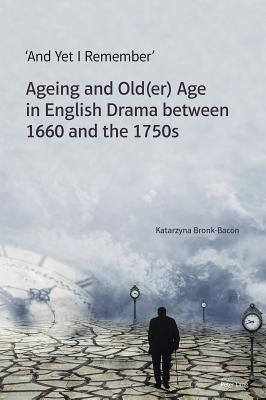
- We will send in 10–14 business days.
- Author: Katarzyna Bronk-Bacon
- Publisher: Peter Lang Ltd, International Academic Publishers
- ISBN-10: 1788745744
- ISBN-13: 9781788745741
- Format: 15 x 22.4 x 1.8 cm, softcover
- Language: English
- SAVE -10% with code: EXTRA
Reviews
Description
«And Yet I Remember» explores representations of ageing and old age in English drama from 1660 to the 1750s. Within these approximately ninety years, England witnessed significant developments in medicine and the advent of sentimental philosophy, which began to transform attitudes toward old age and ageing. This study discusses the enduring cultural and literary stereotyping of old(er) people in culture and drama of this period. The chapters are organised around the stereotypes that kept reappearing in cultural, medical and religious narratives on old age, namely the desiring old man (senex amans) and woman (the «lusty old widow») and the nostalgic and wise elder. Exploring many diverse storylines between 1660 and the 1750s that treat old age and present old(er) characters, the analyses in this study further show how the choice of genre, personal experiences and attitudes of the playwright, and political and cultural revolutions affected the representation of older people.
EXTRA 10 % discount with code: EXTRA
The promotion ends in 19d.12:56:01
The discount code is valid when purchasing from 10 €. Discounts do not stack.
- Author: Katarzyna Bronk-Bacon
- Publisher: Peter Lang Ltd, International Academic Publishers
- ISBN-10: 1788745744
- ISBN-13: 9781788745741
- Format: 15 x 22.4 x 1.8 cm, softcover
- Language: English English
«And Yet I Remember» explores representations of ageing and old age in English drama from 1660 to the 1750s. Within these approximately ninety years, England witnessed significant developments in medicine and the advent of sentimental philosophy, which began to transform attitudes toward old age and ageing. This study discusses the enduring cultural and literary stereotyping of old(er) people in culture and drama of this period. The chapters are organised around the stereotypes that kept reappearing in cultural, medical and religious narratives on old age, namely the desiring old man (senex amans) and woman (the «lusty old widow») and the nostalgic and wise elder. Exploring many diverse storylines between 1660 and the 1750s that treat old age and present old(er) characters, the analyses in this study further show how the choice of genre, personal experiences and attitudes of the playwright, and political and cultural revolutions affected the representation of older people.


Reviews